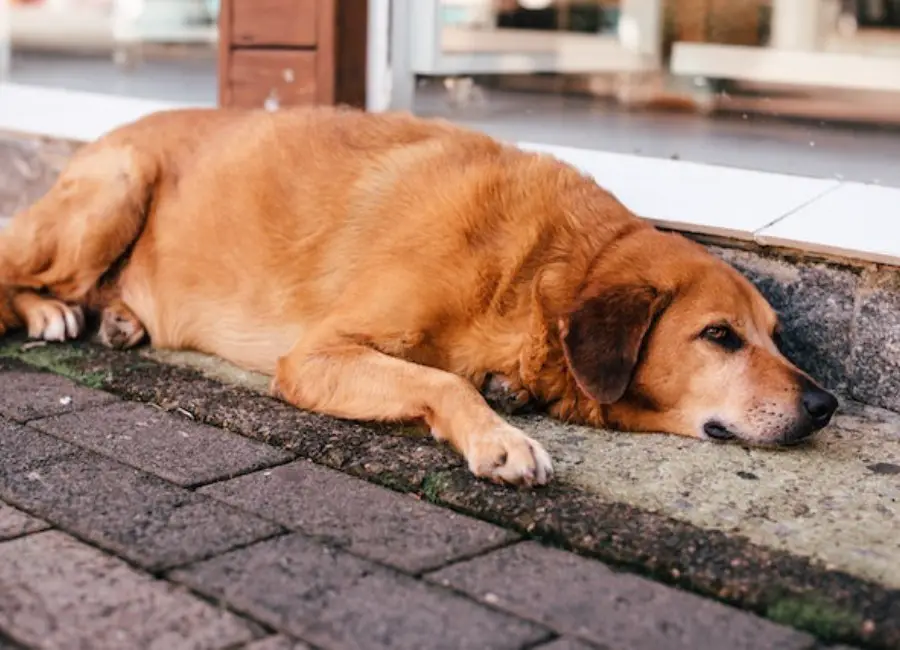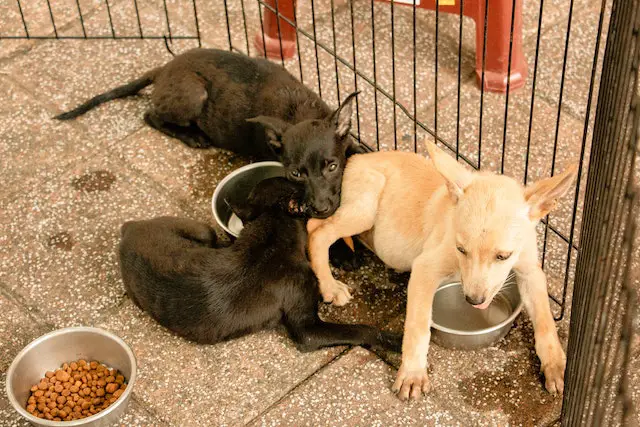11 Reasons For Dog Stomach Gurgling And Not Eating

We all know that feeling of worry when our furry friends start acting out of the ordinary, especially when it comes to their appetite.
Have you ever noticed that your pup’s stomach starts gurgling loudly, but they don’t seem interested in their food? Well, you’re not alone!
In this short blog post, we’ll discuss the possible reasons behind your dog’s stomach gurgling and lack of appetite, so you can better understand your pup’s behavior and take the necessary steps to keep them healthy and happy.
So, let’s dive in!
Dog Stomach Gurgling Not Eating
Dog stomach gurgling and not eating can be a sign of various issues including indigestion or an upset stomach.
However, in some cases, it could also suggest that the dog is suffering from the presence of intestinal parasites or is experiencing inflammatory bowel disease.
If your dog’s stomach is gurgling and they’re not eating, you can try switching to a bland diet such as boiled chicken and rice or take them to a vet for a proper examination and diagnosis.
In some cases, dogs may also ingest excess air while eating too quickly, which can cause stomach-gurgling noises.
Hence, it is important to consult with a vet if your dog is showing any such signs. Learn more about dog care tips.
Let’s break it down further…
Reasons For Dog Stomach Gurgling And Not Eating

The following are some common reasons for dog stomach gurgling and not eating:
1. Dietary Changes
Similar to people, most breeds of dogs can have sensitive stomachs, which can lead to dog stomach gurgling and not eating.
Their digestive system might be upset by abruptly switching their diet or introducing new treats, which can cause stomach rumbling and a decrease in appetite.
Your dog must be introduced to a new diet gradually, alternating between the old and the new food over a number of days.
If your dog’s feeding patterns have altered recently, it can be worthwhile to determine whether dietary changes are to blame.
2. Gastrointestinal Upset
When a dog has digestive distress, its stomach frequently gurgles. This could happen if your dog eats expired food, trash, or other things that aren’t healthy for dogs to consume.
Dogs are known for being inquisitive and occasionally ingesting inappropriate items.
Stomach gurgling, in addition to other signs like vomiting, diarrhea, or general discomfort, can indicate that your dog has consumed something potentially harmful.
Learn more about a dog shaking and not eating.
3. Inflammatory Bowel Disease (IBD
A chronic disorder known as inflammatory bowel disease causes inflammation in the digestive system.
IBD in dogs frequently results in stomach rumbling, diarrhea, weight loss, and decreased appetite.
IBD’s precise cause is unknown, however, elements like genetics, food, and immune system anomalies may play a role in its emergence.
Through several testing, including bloodwork, fecal examinations, and endoscopies, a veterinarian can identify IBD and create a treatment plan to efficiently manage the condition.
4. Bacterial or Viral Infections
Dogs who have bacterial or viral infections may also experience stomach rumbling and a decrease in appetite.
For instance, gastroenteritis is an infection brought on by a virus or bacteria that causes inflammation of the stomach and intestines.
Dehydration, fever, diarrhea, and vomiting are possible symptoms. Parvovirus, another dangerous illness that mostly affects puppies, is very contagious.
It may result in vomiting, severe nausea, and severe gastrointestinal distress, which may include bloody diarrhea.
To give suitable care and supportive assistance, and prevent problems, it is essential to seek veterinary assistance.
5. Hunger or Gas
A gurgling stomach might occasionally be the result of your dog being hungry. Just like people, dogs get the munchies.
The digestive acids and gases in their stomachs can produce gurgling sounds when their stomachs are empty.
As a general rule, make sure your dog is receiving regular, well-balanced meals, and check to see whether the gurgling stops after eating.
6. Intestinal Parasites
The digestive system of your dog might suffer greatly from internal parasites like worms.
These bothersome organisms have the potential to irritate, inflame, and disturb regular digestive functions.
Your vet should examine a stool sample if you notice stomach gurgling along with weight loss, a potbellied appearance, or changes in stool consistency.
They are able to determine the kind of parasite present and make suitable deworming recommendations to get rid of the infestation and improve your dog’s digestive health.
Learn more about health issues in dogs.
7. Foreign Body Ingestion
Dogs with an insatiable curiosity often consume things they shouldn’t.
It can result in gastrointestinal distress if your dog consumes a foreign object, such as a toy, sock, or even a little piece of bone.
The foreign body may irritate or block the digestive system, which can cause stomach rumbling and a decrease in appetite.
Watch out for signs including vomiting, pain in the stomach, problems urinating, or a change in behavior.
Foreign bodies that have been consumed can be fatal and may need to be removed surgically.
If you think your dog ate anything they shouldn’t have, get them medical attention right away.
8. Side Effects of Medications
Nonsteroidal anti-inflammatory drugs (NSAIDs), for example, can irritate a dog’s stomach and make gurgling noises.
These drugs are frequently used to treat inflammation and pain.
These medications, however, may cause stomach pain and decreased appetite in some dogs who are particularly sensitive to them.
If your pet is on medicine and exhibits these symptoms, talk to your veterinarian to see if a different medication or dosage change is required.
Learn more about how deworming can cause vomiting and diarrhea in dogs.
9. Allergies or Food Intolerances
Dogs can experience dietary allergies or intolerances much like people do.
If your dog starts gurgling after eating a certain substance, it could be an indication of a bad reaction.
Dogs frequently have allergies to meat, chicken, dairy, wheat, and soy.
Your veterinarian may perform allergy testing or an elimination diet to assist you pinpoint the problem and direct you toward the right nutritional changes.
10. Pancreatitis
Stomach rumbling, abdominal pain, and a dislike of food are all symptoms of pancreatitis, an inflammation of the pancreas.
High-fat diets, obesity, particular drugs, or underlying medical issues can all cause it.
Pancreatitis may be a dangerous and even fatal ailment in dogs, so it’s important to seek veterinary help right away if you have any reason to believe your dog may have it.
To properly manage pancreatitis, your veterinarian may suggest altering your food, using certain medications, and changing your way of life.
Managing Dog Stomach Gurgling And Not Eating

There are several ways to manage dog stomach gurgling and loss of appetite.
- Offer bland food: Feed your dog small frequent meals of a bland diet such as boiled chicken and rice, which are easy to digest and help to soothe the stomach.
- Change feeding schedule: Divide the daily food intake into smaller portions and feed more frequently throughout the day. This helps to keep the stomach from being empty for a long time, which can lead to hunger sounds and discomfort.
- Limit treats: Avoid giving any treats or table scraps to your dog, which may aggravate the situation.
- Provide plenty of water: Make sure that your dog has access to fresh water at all times. Dehydration can worsen the symptoms and lead to further health issues.
- Adding probiotics: Adding probiotics or digestive supplements to your dog’s diet to improve gut health.
- Monitor closely: Observe your dog’s behavior and appetite closely. If your dog is not improving or showing signs of dehydration or lethargy, it’s time to consult a veterinarian.
It’s important to note that persistent stomach gurgling and loss of appetite can be an indication of a more serious underlying health issue, so it’s important to seek veterinary care if the symptoms persist.
Preventing Dog Stomach Gurgling and Not Eating
Stomach gurgling and not eating in dogs can be a sign of various issues such as pain, upset stomach, or even serious health conditions like stomach cancer.
Here are some common ways to prevent stomach gurgling and not eating in your dog:
- Feed smaller and more frequent meals: Try feeding small meals throughout the day instead of larger meals. This can help avoid stomach gurgling and discomfort.
- Use digestive aids: Digestive aids such as probiotics can help maintain the good bacteria in the gut, reduce inflammation, and promote digestive health.
- Avoid feeding human food: Human food can upset the digestive system of dogs, so it’s essential to avoid feeding them anything other than dog food.
- Slow down feeding: Dogs that eat too fast can gulp down air along with their food, leading to stomach gurgling and bloating. Therefore, slow down your pup’s eating by feeding them slowly or using a slow feeder.
- Keep your dog hydrated: Make sure your dog always has fresh water available, which can aid digestion.
- Avoid exercise after meals: Exercise after meals can cause stomach gurgling and discomfort. Wait for at least an hour after feeding your dog before engaging them in any physical activities.
- Include fiber in their diet: Adding some fiber to your dog’s diet can help keep the digestive system healthy and regular.
- Eliminate table scraps: Table scraps should be avoided at all costs as they can cause upset stomachs and lead to vomiting and diarrhea.
- Visit a veterinarian regularly: Regular visits to the vet can help detect and treat any underlying condition that may be causing stomach gurgling and not eating in dogs.
By following these tips, you can help prevent stomach gurgling and not eating in your dog and ensure their digestive system is healthy and regular.
When to seek veterinary care for your dog’s stomach gurgling and not eating

There is no need to be alarmed if you hear your dog’s stomach making noises, as it is typically a normal bodily function.
However, if your dog’s stomach is making loud intestinal noises and they also seem sick, then you should seek veterinary care immediately.
Loss of appetite in a dog can also be a sign of illness, so if you notice changes in your dog’s normal eating habits or they are not eating at all, it’s important to seek veterinary help.
Obstructions and digestive issues are medical emergencies that require professional veterinary care.
Related Questions
Why is my dog’s stomach making loud gurgling noises?
Loud stomach gurgling noises are a common sign of an upset stomach in dogs. It can be due to a variety of reasons, such as eating too fast, indigestion, or even a virus. If the gurgling persists and your dog is not eating or drinking, it is best to consult a veterinarian for proper diagnosis and treatment.
Is it normal for a dog to skip a meal or two?
Dogs may occasionally skip a meal or two, especially if they are not feeling well or are stressed. However, if your dog is not eating anything for more than 24 hours and is showing other signs of illness like lethargy, vomiting, or diarrhea, it is crucial to seek veterinary attention immediately.
Can dehydration cause a dog’s stomach to gurgle?
Yes, dehydration can cause stomach gurgling in dogs. When a dog is dehydrated, the digestive system produces less saliva and other digestive enzymes that are necessary for food to move smoothly through the digestive tract. This can lead to gurgling noises and abdominal discomfort.
Can an upset stomach cause a dog to stop eating?
Yes, if a dog has an upset stomach, it may lose its appetite and stop eating. Other signs of an upset stomach in dogs include vomiting, diarrhea, lethargy, and abdominal pain. If the symptoms persist or worsen, consult a vet for evaluation and treatment.
What can I give my dog for stomach gurgling and not eating?
It is not recommended to give any over-the-counter medications to dogs without consulting a veterinarian. You can try feeding your dog small, bland meals like boiled chicken and rice or offering some low-sodium chicken broth to help ease stomach discomfort. However, if the symptoms persist, it is best to seek veterinary attention.
Conclusion
In conclusion, if you ever notice your furry friend’s stomach gurgling and them refusing to eat, don’t panic! It’s quite normal, and there are many reasons why it happens.
However, it’s always better to err on the side of caution and take your dog to the vet if it persists or you notice any other concerning symptoms.
Remember to keep your furry friend happy and healthy by getting regular check-ups with your vet and by giving them all the love and care they deserve. After all, they’re a part of the family!
